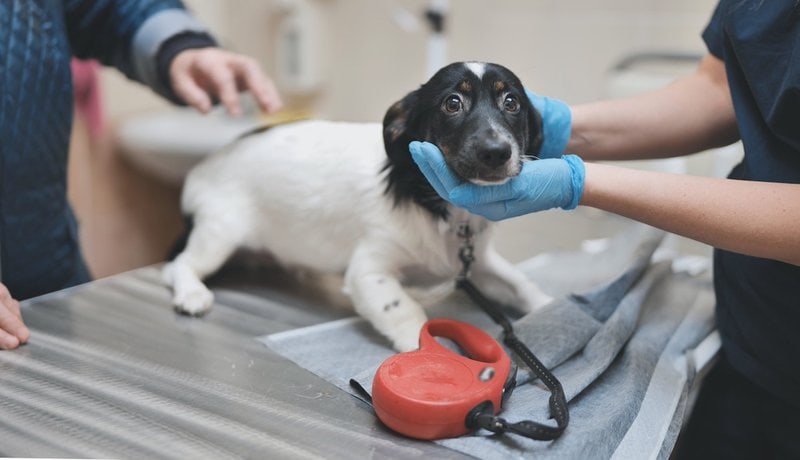Are you concerned about potential parasites and other infectious organisms that may affect your beloved furry friend? If so, it’s important to stay informed and aware of Giardia – a parasite that can cause serious health issues if left untreated.
Giardia is a highly contagious intestinal parasite that can cause severe gastrointestinal distress or death if left untreated in dogs. This organism is found worldwide and can affect dogs of all ages, from puppies to adults. While it can be difficult to diagnose, pet owners need to know about this condition to take the necessary steps to protect their animals.
Even the most conscientious dog owners may need to learn exactly what Giardia is, how it might impact your pup, or what steps you can take to ensure their safety and well-being. So keep on reading – in this blog post, we’ll discuss everything you need to know about Giardia in dogs!
How Does A Dog Get Giardia?
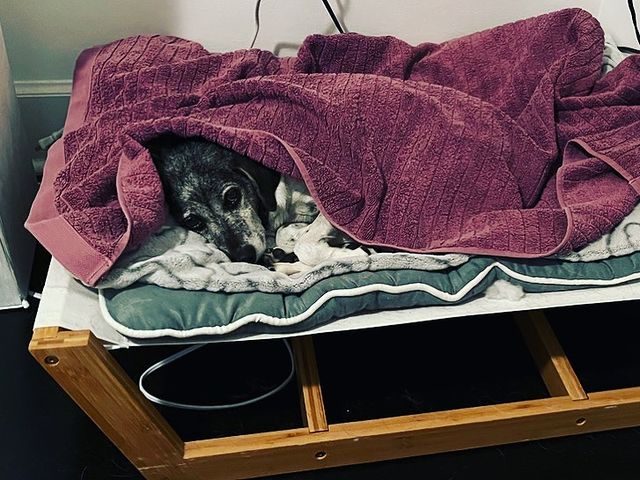
Giardia is caused by a unicellular parasite, Giardia lamblia protozoan. It spreads through contact with the feces of an infected dog or cat. Your pooch may become infected if it comes into contact with contaminated food, water, soil, or other objects carrying the parasite.
Here we’ll take a deeper into the reasons that may cause Giardia in your fur ball.
Consuming Cysts
Eating cysts contaminated with Giardia is the primary way dogs become infected with the parasite. The dormant form of Giardia cysts can come from contaminated sources and, when ingested, attach to a dog’s small intestine, where they become active.
Once inside the body, the parasites attach to the lining of the small intestine, will reproduce, and release new infectious cysts back into the environment, which can recurrently infect other canines and humans.
Hunting Contaminated Prey
When a dog ingests contaminated prey, it can be infected with Giardia, which lives in many animals’ intestines. Giardia has been found in wild and domestic animals and humans. When an animal is infected with Giardia, it releases cysts, oval-shaped structures, into the environment.
These cysts can survive in the environment for long periods, even in cold temperatures. The dog may become infected when your dog hunts or scavenges prey contaminated with Giardia cysts.
Can Dogs With Giardia Be Around Other Dogs?
It is important to isolate your pup with Giardia from other pets in the household, including any cats and dogs. This helps prevent the spread of the Giardia parasite and will help protect the other animals from infection. When your canine has been diagnosed with Giardia, it is important to keep them away from other dogs until they have received treatment and their symptoms have subsided.
Any pooch exposed to the Giardia-infected animal should be checked for signs of infection and treated if necessary. Additionally, all pets in the household should be vaccinated against Giardia, as this will help reduce the risk of developing the disease.
Can You Smell Giardia In Dogs?
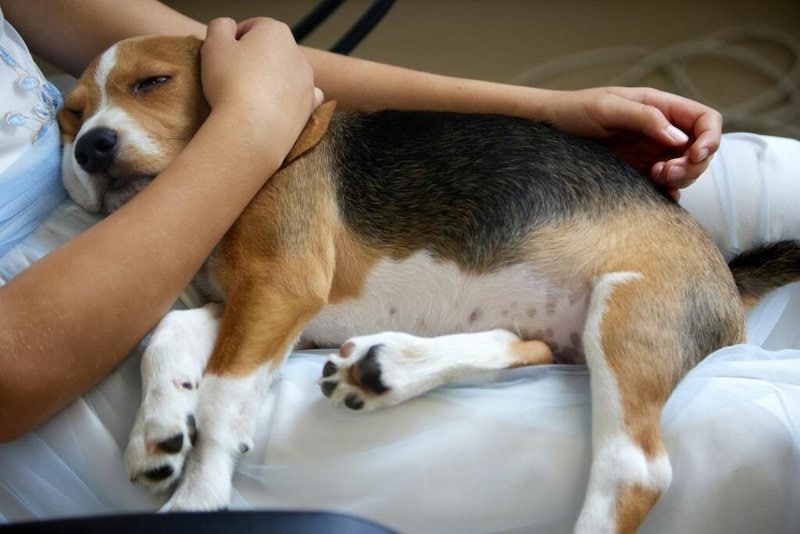
Yes, you can smell Giardia in dogs. Giardia can be detected through laboratory tests but may also produce an unpleasant odor. The most common symptom of giardiasis is foul-smelling diarrhea, so detecting a strong, unpleasant scent from your dog’s stools could signify Giardia.
Can Giardia Live On Dogs’ Fur?
Yes, Giardia can live on dogs’ fur. The parasites can also be passed from one dog to another if they come into direct contact or if your pooch licks an infected area on another dog. Additionally, Giardia can transfer from a dog’s fur to other animals or even humans.
What Does Giardia Dog Poop Look Like?
Giardia dog poop can range from soft and formed to watery. It may have a greenish tinge, but the light coloring could also be caused by bile or other things. The poop may also have a strong odor, similar to rot. Giardia often causes diarrhea, so if your puppy’s poop is particularly loose, it may be a sign that they have contracted the infection.
Does Giardia Poop Stink?
The answer is yes. Giardia poop often has a distinctive odor that can be difficult to describe since everyone perceives scents differently. However, some describe it as sulfuric or musty.
In addition to its odor, Giardia poop may also appear greasy and float on top of the toilet water due to its high fat content. It’s important to note that other causes of diarrhea may also produce a different smell than regular poop. You may wonder what will happen if you don’t get your canine checked for Giardia, so let’s find it out in the next section.
What Happens If Giardia Is Left Untreated In Dogs?
In severe cases, Giardia can even lead to death if left untreated. While its prevalence in dogs varies widely depending on the area, it is thought to be fairly common, with estimates ranging from 0.44% to 39% of shelter dogs having positive test results!
A recent study also found that over 70% of dog parks tested positive for Giardia, making prevention and early detection important. Let’s find out how serious Giardia can be for your little furball.
How Serious Is Giardia In Dogs?
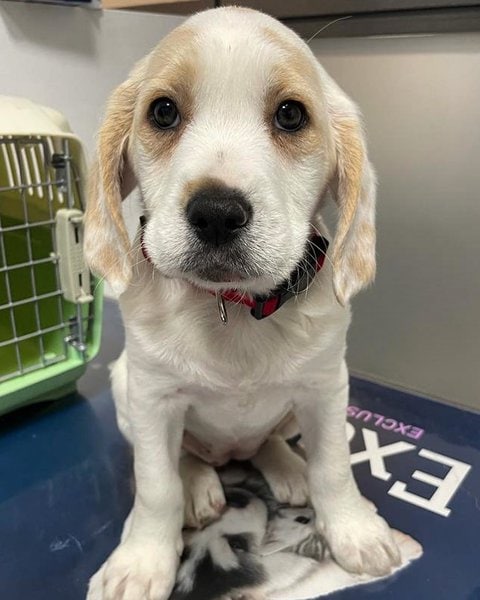
Puppies and debilitated adult dogs are particularly susceptible to severe symptoms, including life-threatening intestinal problems and nausea. Even when the stool of a healthy adult dog without diarrhea contains Giardia cysts, it is still important to get medical attention for your pup.
Foul-Smelling
Giardia is a microscopic parasite that can cause gastrointestinal illness. In particular, it often causes foul-smelling gas and stools due to its metabolic activity in the intestines. Giardia releases certain compounds into the digestive tract that are responsible for the unpleasant odor.
These compounds include short-chain fatty acids, sulfur compounds, and ammonia. In addition, the Giardia organism can also produce an unpleasant smell when excreted in the feces. The foul odor associated with Giardia infection can be difficult to eliminate, but medication treatment can eliminate the problem and improve overall health.
Nausea
The exact mechanism Giardia uses to cause nausea has yet to be fully elucidated. However, it is believed to be related to the release of toxins by the parasite in the gastrointestinal tract.
Giardiasis is also known to cause other digestive issues, such as abdominal cramps, diarrhea, and indigestion. All of these can contribute to nausea or make it worse. The infection can also lead to a decreased appetite, which may contribute to feeling nauseous.
Intestinal Problems
Giardia causes intestinal problems by attaching itself to the small intestine of your dog, where it feeds on nutrients and secretes toxins, leading to inflammation and irritation of the intestinal lining. It also interferes with the absorption of nutrients, leading to malnourishment and further health problems.
How Common Is Giardia In Dogs?
Giardia is a common intestinal parasite that widely affects dogs. The most common way for it to spread is through contact with contaminated feces or water. Giardia can cause diarrhea, vomiting, dehydration, weight loss, and poor appetite in affected animals. Let’s take a deeper look into the symptoms of Giardia in dogs in the following section!
What Are Signs Of Giardia In Dogs?
The most common symptom of giardiasis is diarrhea with greasy, foul-smelling stools that may contain mucus and/or blood. Other signs include weight loss, lethargy, dehydration, increased gas production, and abdominal discomfort.
In some cases, the dog may show no signs of illness but still be infected with Giardia. Let’s discuss each symptom in a bit of detail!
Weight Loss
Giardia causes weight loss as one of its symptoms. When a dog becomes infected with Giardia, it can cause gastrointestinal problems, which interfere with its ability to digest food properly and absorb nutrients from its diet. As a result, they start losing weight.
Watery Diarrhea
Giardia causes watery diarrhea in dogs by attaching to the wall of the dog’s small intestine with a sucker-like organelle. The parasite then feeds on nutrients from the gut and secretes toxins that damage the intestinal wall, leading to inflammation and subsequent diarrhea.
The infection is also often accompanied by an increase in mucus production, which contributes to the watery consistency of diarrhea.
Gas
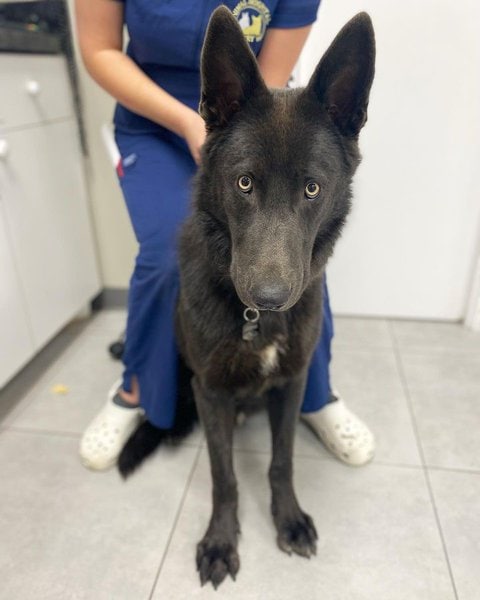
Giardia causes gas in dogs because it affects the intestines and digestion. The Giardia organism attaches itself to the lining of the small intestine and interferes with the absorption of nutrients. As a result, undigested carbohydrates pass through to the large intestine and are broken down by bacteria instead.
This process of bacterial fermentation causes gas and bloating. Additionally, Giardia can disrupt the normal balance of bacteria in the intestines and stimulate inflammation in the digestive system, which can further contribute to excess gas production.
Poor Coat Appearance
Giardia can also cause poor coat appearance in dogs. This can occur when the parasites infect the intestines, causing diarrhea and other gastrointestinal issues. The resulting nutrient deficiencies can lead to an unhealthy-looking coat with dull fur and a lack of shine. These parasites can also lead to skin infections, itching, and hot spots, which lead to hair loss and further poor coat appearance.
Dehydration
Since this microscopic parasite multiplies, Giardia disrupts the absorption of nutrients from food, leading to symptoms such as diarrhea, vomiting, and weight loss. The resulting dehydration causes an imbalance of electrolytes in the body, which can be dangerous and even fatal if left untreated.
Furthermore, the loss of electrolytes through diarrhea can cause dehydration and make it difficult for a dog to get enough water to stay hydrated. In addition, dehydration can lead to muscle weakness, confusion, and increased susceptibility to infection.
Since you are all aware of the symptoms of Giardia, let’s see what you can feed your furry companions during their sick days.
What Do You Feed A Dog With Giardia?
A good diet for a dog with Giardia should include food that is low in fat and high in easily digestible carbohydrates. This will help reduce the amount of work your dog’s digestive system has to do and allow it to heal more quickly. A few simple ingredients, like cooked white rice, boiled potatoes, or oatmeal, can make up the bulk of your dog’s diet.
You can add a few tablespoons of boiled, lean hamburger or skinless chicken to provide some protein. Be sure to add some vegetables as well. Cooked vegetables like green beans and carrots are gentle on the digestive system and will provide important vitamins for your pet’s recovery.
Avoid giving raw vegetables, as these can be difficult to digest and may worsen the symptoms of Giardia. Finally, make sure your pet is getting enough fluids.
Give them plenty of fresh water and add a low-sodium chicken or beef broth.
This will help keep them hydrated while they heal. Here we break down the foods with maximum health benefits for your sick canine:
Unseasoned Boiled Chicken
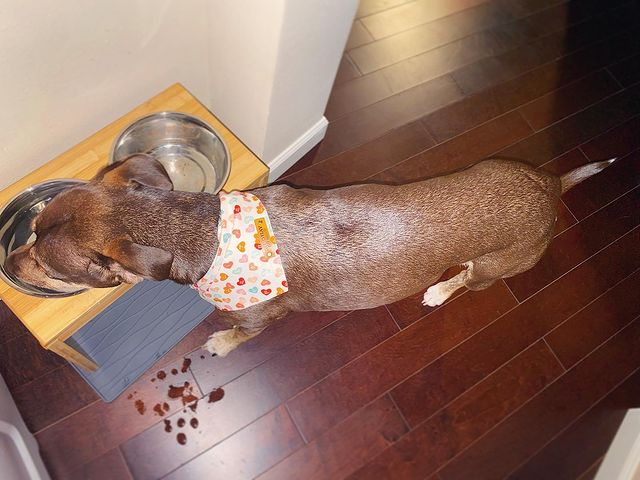
Unseasoned boiled chicken is an excellent option for dogs with Giardia, as it can help soothe an upset stomach and provide nutrition. Boiled chicken offers a lean source of protein that’s easy to digest, which can help reduce symptoms of Giardia, including diarrhea.
Since unseasoned boiled chicken is bland, it won’t irritate an already sensitive digestive system and cause further distress. Furthermore, boiled chicken provides essential vitamins and minerals to help keep your pup in optimal health.
Boiled Rice
Feeding boiled rice to dogs suffering from Giardia is beneficial because the cooking process helps to reduce the number of toxins and bacteria in the food. This reduces the risk of reinfection and helps improve your dog’s overall gut health.
Boiled rice also provides a great source of digestible carbohydrates for dogs with Giardia issues, which helps to provide energy and keep their digestive tract functioning properly. This can also help with weight management in dogs, as boiled rice is a low-fat option.
Additionally, the texture of boiled rice makes it easier for a dog to chew and digest than dry kibble or wet food that may contain more difficult-to-digest ingredients.
Pumpkin With Seeds
Pumpkin seeds contain high levels of essential fatty acids, zinc, and magnesium that benefit dogs with Giardia. Fatty acids help to improve the immune system and reduce inflammation caused by the parasite. Zinc plays an important role in helping to maintain healthy skin and coat while aiding digestion.
Magnesium is used by the body for energy production and helps to maintain normal nerve and muscle function. Additionally, pumpkin seeds are a great source of fiber, which is beneficial in aiding digestion and preventing giardiasis from becoming more severe.
Bone Broth
Bone broth is an excellent source of nourishment for dogs with Giardia, a common intestinal parasite. It is rich in collagen and gelatin, which help strengthen and repair the gut lining to reduce inflammation. The high levels of glycine and proline found in bone broth can also help improve digestion and soothe inflamed mucous membranes.
Additionally, bone broth is a rich source of minerals and vitamins that can help boost the dog’s immune system and reduce its risk of contracting Giardia in the future. Moreover, its high magnesium and potassium content can help flush out toxins from the dog’s system, reducing the symptoms associated with giardiasis.
Baby Food
Feeding baby food to dogs suffering from Giardia can be a great way to help support their recovery. Baby food is often easy for dogs to digest and contains gentle ingredients on their stomachs, which can be especially helpful when dealing with an infection like Giardia.
Additionally, baby food typically includes fewer potential allergens than traditional dog food, reducing the risk of an allergic reaction. Besides giving baby food to your pooch, let’s see how we can get rid of Giardia in dogs.
How Do You Get Rid Of Giardia In Dogs?
The most common treatment for Giardia in dogs is using antiparasitic medications, such as fenbendazole and metronidazole.
Depending on your dog’s size and weight, fenbendazole is typically given for five to seven days. Metronidazole is usually given in a single dose but may require repeated doses if the Giardia persists.
Let’s break down the details about the treatment of Giardia for your furry companion.
Metronidazole
Metronidazole is a commonly prescribed drug for dogs with Giardia. It works by interfering with the ability of Giardia to make proteins, which are essential for the parasite’s survival. This disruption in the normal reproductive cycle of the parasites can stop them from multiplying and eventually kill off their numbers.
In addition to killing off the infection, metronidazole also helps to reduce inflammation in your dog’s intestines, where most of the Giardia infection is located. This reduces symptoms associated with giardiasis, such as vomiting, diarrhea, and abdominal pain.
Fenbendazole
Fenbendazole is an anthelmintic drug used to treat a variety of intestinal parasites, including Giardia, in dogs. Fenbendazole is effective against Giardia because it can disrupt the parasite’s energy production process by blocking its glucose metabolism pathways.
This results in the death of the parasites, leading to the clearance of the infection. Treatment using fenbendazole typically lasts for three days, and it is important to follow up with your veterinarian after treatment to ensure that all parasites are gone.
Fluid Therapy
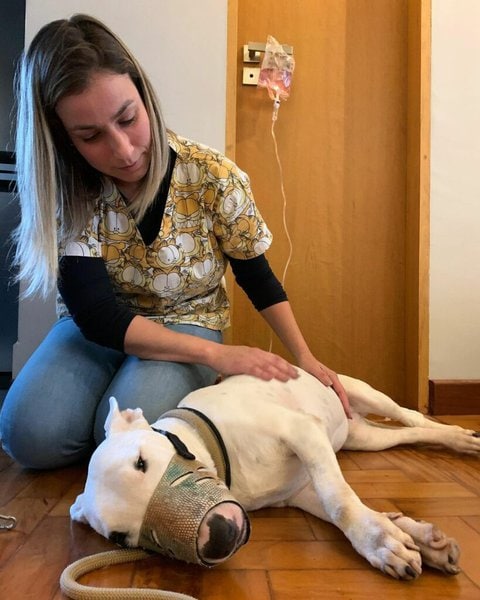
Fluids are usually given intravenously or subcutaneously, depending on the severity of the infection and the dog’s overall health. Intravenous fluids provide an immediate source of hydration and electrolytes that can replace those lost from diarrhea. Subcutaneous fluids help maintain hydration over a longer period and supplement oral hydration solutions.
Fluid therapy is a safe, effective treatment for dogs with Giardia. Fluids help flush out infected cells and replace electrolytes lost due to diarrhea. They also help improve hydration and maintain adequate kidney function, which is important for fighting infection. A dog can recover from Giardia in as little as two weeks with proper care.
What Naturally Kills Giardia In Dogs?
Cloves are relatively safe for dogs, so they can help treat Giardia in dogs. Clove oil can be added to food or water and given to the dog as part of their diet. In addition, cloves are known to have antifungal properties, so they may also help treat other intestinal parasites.
Cloves
Cloves are a powerful antiparasitic that can help eliminate Giardia and other parasites in your dog’s body. To use cloves, add ½ teaspoon to your pet’s food daily. Cloves contain an ingredient called eugenol, which is extremely effective against Giardia and other parasites.
Coconut
This is another natural remedy that can help kill Giardia in dogs. Coconut contains lauric acid, which is effective against Giardia. To use coconut in your pet’s diet, add ½ teaspoon of shredded coconut to their food daily. This will help to get rid of Giardia.
Apple Cider Vinegar
Apple cider vinegar can also be used to kill Giardia in dogs. Simply add one teaspoon of apple cider vinegar to your pet’s food each day. The acidity will help kill off any parasites present in the dog’s body, including Giardia.
Grapefruit Seed Extract
The grapefruit seed extract is also an effective natural remedy against Giardia. Add ½ teaspoon of the extract to your pet’s food daily. This will help to kill off any parasites present in the body, including Giardia.
Using these natural remedies can help get rid of Giardia in dogs. Be sure to use them regularly and consult your veterinarian if you have any concerns about the safety of these remedies for your pet. With regular use, these natural remedies can help get rid of Giardia in dogs quickly and effectively.
How Long Does It Take For A Dog To Get Rid Of Giardia?
The length of time it takes for your dog to get rid of Giardia is highly dependent on the effectiveness of their treatment. Generally, dogs treated with antiparasitic medication can be expected to recover within 1 to 2 weeks.
After the initial treatment, you should monitor your pet’s health by regularly checking their feces and observing their behavior. If your dog is still unwell after a few days, it may indicate that their Giardia has not been cleared, and they will require further medical attention. Since you know how long it takes a pooch to recover, let’s check out the home hygiene in this case.
Do I Need To Disinfect My House If My Dog Has Giardia?
Yes, to further prevent the spread of Giardia, it is important to practice good hygiene and clean up after pets immediately. Regular bathing and grooming are also recommended for all dogs. Ensure your pet has access to fresh water and their living area is free of feces.
The vet may prescribe medication to help clear the infection if your pet is infected. It is also important to keep other pets away from your infected dog until they have been treated and cleared of all parasites.
Clean And Disinfect Household Areas
Cleaning and disinfecting household areas where your pet may have been exposed to the parasite is an important step in preventing the spread of Giardia. Cleaning and disinfecting will help to remove any contaminants that may be present in the environment, as well as reduce your dog’s risk of becoming infected.
Clean Pup’s Toys
Cleaning your pet’s toys also removes any dirt or debris that can be a breeding ground for bacteria and other germs. You should use a mild, pet-safe detergent to clean your pup’s toys. Make sure it’s safe for them if they happen to lick or chew on the toy after you’ve cleaned it.
You can also soak their toys in warm, soapy water for about five minutes before rinsing them thoroughly. After that, you should air dry the toys completely before giving them back to your pup.
Wash Bedding
Washing bedding is an important part of preventing the spread of Giardia. The parasite can survive for up to a month on fabrics and will be passed from person to person and animal to animal if infected items are not washed regularly.
Bedding should be washed in hot water and dried on a high heat setting to kill any parasites that may be present. Additionally, any bedding used by an infected dog should not be shared with other animals to further limit the spread of Giardia.
How Do I Get Rid Of Giardia In My Yard?
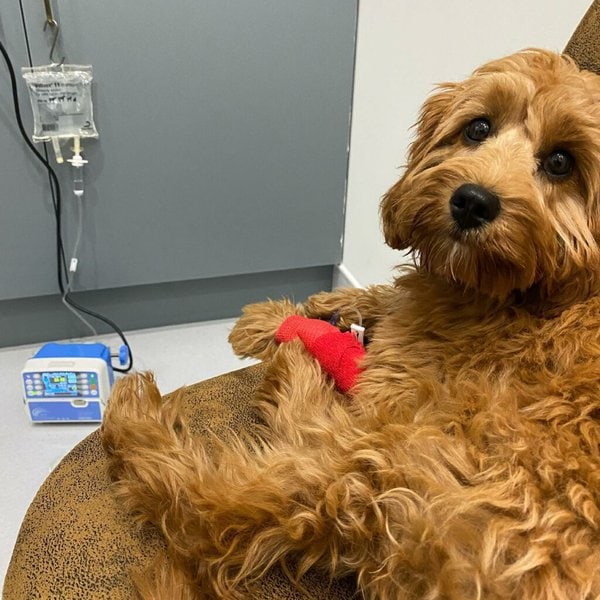
Regularly removing pet waste from your yard is the most important step to getting rid of Giardia. This should be done as soon as possible to help prevent the spread of this parasite, as it may affect other animals and even humans. If your canine spends time in the yard, make sure to clean up the feces at least once a day.
In addition to removing pet waste, keep standing water away from areas where your pup may come into contact with it, as this could be a source of infection. You should also regularly mow your lawn, which will help eliminate areas of standing water and reduce the amount of organic matter where Giardia can survive.
Can I Get Giardia From My Dog Licking Me?
Giardia can be transmitted from animal to human contact. In the case of dogs, it can be passed on through licking and other forms of physical contact.
You can contact the infectious parasite if your dog has giardiasis and licks your face or hands. Observing your pet for any signs of giardiasis is important, as early detection and treatment are key in preventing transmission.
Additionally, it is best to practice good hygiene habits, such as washing your hands after petting or playing with dogs that may be infected with Giardia. Doing so can help protect yourself and your family from getting sick.

